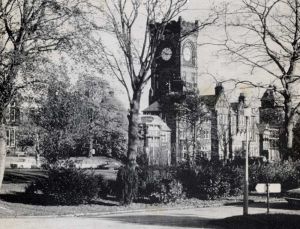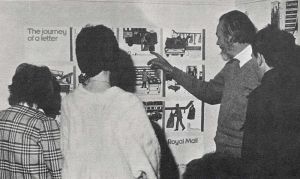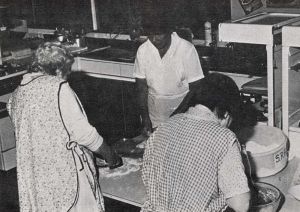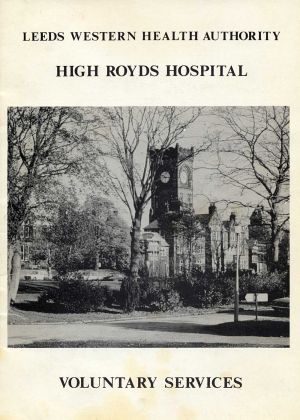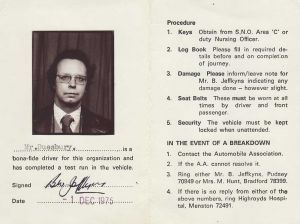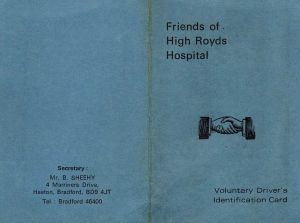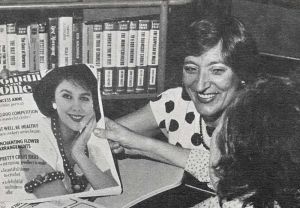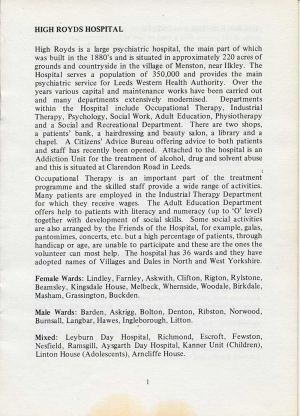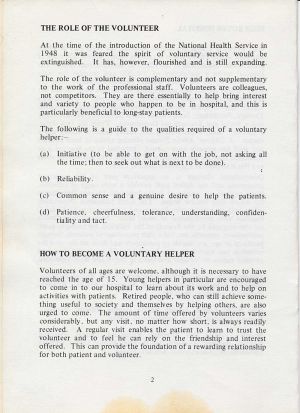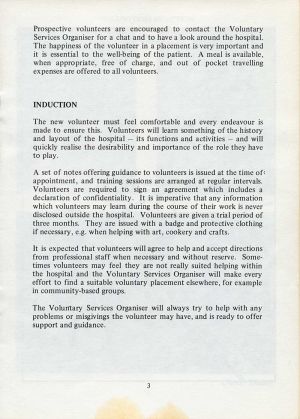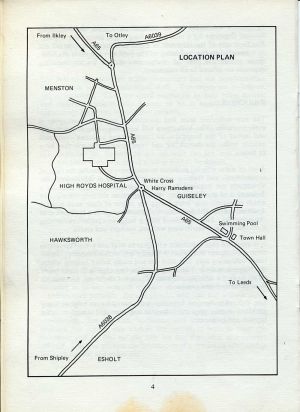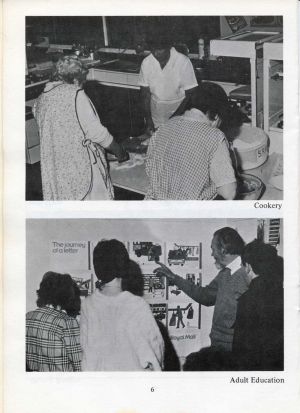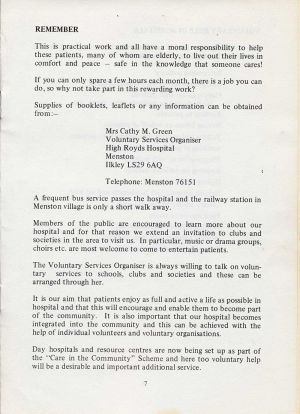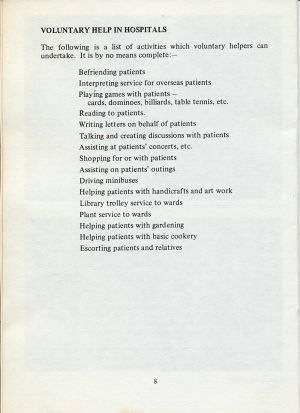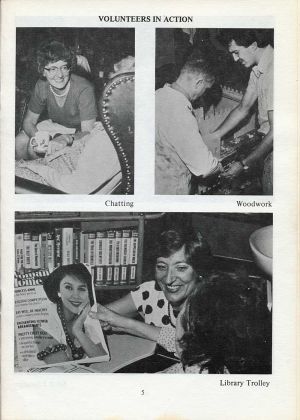Kindly donated By Ken Duesberry..
High Royds is a large psychiatric hospital, the main part of which was built in the 1880’s and is situated in approximately 220 acres of grounds and countryside in the village of Menston , near llkley . The Hospital serves a population of 350,000 and provides the main psychiatric service for Leeds Western Health Authority. Over the years various capital and maintenance works have been carried out and many departments extensively modernised. Departments within the Hospital include Occupational Therapy, IndustrialTherapy, Psychology, Social Work, Adult Education, Physiotherapy and a Social and Recreational Department. There are two shops, a patients’ bank, a hairdressing and beauty salon, a library and a chapel. A Citizens’ Advice Bureau offering advice to both patients and staff has recently been opened. Attached to the hospital is an Addiction Unit for the treatment of alcohol, drug and solvent abuse and this is situated at Clarendon Road in Leeds.
Occupational Therapy is an important part of the treatment programme and the skilled staff provide a wide range of activities. Many patients are employed in the Industrial Therapy Department for which they receive wages. The Adult Education Department offers help to patients with literacy and numeracy (up to ‘0’ level) together with development of social skills. Some social activities are also arranged by the Friends of the Hospital, for example, galas, pantomimes, concerts, etc. but a high percentage of patients, through handicap or age, are unable to participate and these are the ones the volunteer can most help .
The hospital has 36 wards and they have adopted names of Villages and Dales in North and West Yorkshire.
Female Wards: Lindley , Farnley, Askwith, Clifton, Rigton , Rylstone , Beamsley, Kingsdale House, Melbeck, Whernside, Woodale, Birkdale, Masham, Grassington, Buckden.
Male Wards: Barden, Askrigg, Bolton, Denton, Ribston,Norwood, Burnsall, Langbar, Hawes, Ingleborough, Litton.
Mixed: Leyburn Day Hospital, Richmond, Escroft, Fewston, Nesfield, RamsgiII, Aysgarth Day Hospital, Kanner Unit (Children), Linton House (Adolescents), ArncIiffe House.
THE ROLE OF THE VOLUNTEER
At the time of the introduction of the National Health Service in 1948 it was feared the spirit of voluntary service would be extinguished. It has, however, flourished and is still expanding .
The role of the volunteer is complementary and not supplementary to the work of the professional staff. Volunteers are colleagues, not competitors. They are there essentially to help bring interest and variety to people who happen to be in hospital, and this is particularly beneficial to long-stay patients.
The following is a guide to the qualities required of a voluntary helper: –
(a) Initiative (to be able to get on with the job, not asking all the time; then to seek out what is next to be done).
(b) Reliability.
(c) Common sense and a genuine desire to help the patients.
(d) Patience. cheerfulness. tolerance, understanding, confidentiality and tact.
HOW TO BECOME A VOLUNTARY HELPER
Volunteers of all ages are welcome, although it is necessary to have reached the age of 15. Young helpers in ‘particular are encouraged to come in to our hospital to learn about its work and to help on activities with patients. Retired people, who can still achieve something useful to society and themselves by helping others, are also urged to come. The amount of time offered by volunteers varies considerably, but any visit. no matter how short. is always readily received. A regular visit enables the patient to learn to trust the volunteer and to feel he can rely on the friendship and interest offered. This can provide the foundation of a rewarding relationship for both patient and volunteer.
Prospective volunteers are encouraged to contact the Voluntary Services Organiser for a chat and to have a look around the hospital. The happiness of the volunteer in a placement is very important and it is essential to the well-being of the patient. A meal is available, when appropriate, free of charge, and out of pocket travelling expenses are offered to all volunteers.
INDUCTION
The new volunteer must feel comfortable and every endeavour is made to ensure this. Volunteers will learn something of the history and layout of the hospital – its functions and activities – and will quickly realise the desirability and importance of the role they have to play. A set of notes offering guidance to volunteers is issued at the time of; appointment, and training sessions are arranged at regular intervals. Volunteers are required to sign an agreement which includes a declaration of confidentiality. It is imperative that any information which volunteers may learn during the course of their work is never disclosed outside the hospital. Volunteers are given a trial period of three months. They are issued with a badge and protective clothing
if necessary, e.g. when helping with art, cookery and crafts.
It is expected that volunteers wiII agree to help and accept directions from professional staff when necessary and without reserve. Sometimes volunteers may feel they are not really suited helping within the hospital and the Voluntary Services Organiser will make every effort to find a suitable voluntary placement elsewhere, for example in community-based groups.
The Voluntary Services Organiser will always try to help with any problems or misgivings the volunteer may have, and is ready to offer support and guidance.
